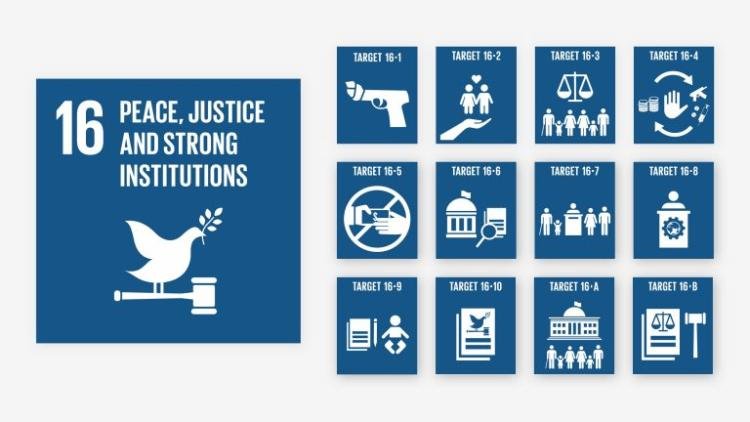By Simone Galimberti*
KATHMANDU | 2 February 2024 (IDN) — SDG 16 is often perceived as solely focused on peace, but it encompasses much more than that. This narrow perspective defines peace as simply the absence of war, which is a false premise.
A group of stakeholders, including governments, is working to debunk this myth and position SDG 16 as the foundational goal of the entire Agenda 2030 Architecture.
This work revolves around a progressive concept of peace that encompasses a comprehensive set of goals. Achieving these goals would not only foster unity but also promote justice for all members of society.
Implementing SDG 16 means striving for inclusion, cohesion, an accessible justice system, and peaceful local communities. It also entails establishing responsive, participatory, and transparent forms of governance.
(According to the UN, Goal 16 is about promoting peaceful and inclusive societies, providing access to justice for all, and building effective, accountable, and inclusive institutions at all levels.)
Reimagining the Rule of Law
Gaining a holistic understanding of SDG 16 requires examining all the segments and sub-elements covered by this goal, which also necessitates a broader definition of the rule of law.
The World Justice Project defines the rule of law as a “durable system of laws, institutions, norms, and community commitment that delivers four universal principles: accountability, just law, open government, and accessible and impartial justice”.
Getting SDG 16 right is essential to grasp the significance of this comprehensive definition and bring about the necessary changes in governance systems to effectively implement the Agenda 2030.
This is where the concept of SDG 16+ comes into play as a catalyst for actions related to all sustainable development goals. The Road Map for Peaceful, Just and Inclusive Societies, a document centered around leveraging the expanded SDG 16 concept, explicitly emphasizes how the Agenda 2030 was conceived with good governance in mind.
“The 2030 Agenda for Sustainable Development calls for: Peaceful, just and inclusive societies that provide equal access to justice and that are based on respect for human rights (including the right to development), on effective rule of law and good governance at all levels, and on transparent, effective and accountable institutions.”
A recent event organized by International IDEA, Pathfinders, and TAP Network, held on the sidelines of the ECOSOC Partnership Forum, aimed to renew attention on the concept of SDG 16+.
Discussing the current status of SDG 16 implementation is crucial because, according to the latest Global progress report on Sustainable Development Goal 16 indicators: A wake-up call for action on peace, justice, and inclusion, there is still much work to be done in this area, and we are far from achieving its targets.
Multistakeholder Partnerships
Throughout the online interaction, which included the participation of H.E. Minister Kenyeh Barley, Minister of Planning and Economic Development of Sierra Leone, there was a strong emphasis on the concept of multistakeholder partnerships as the driving force behind governance system transformation.
The notion of innovative partnerships is appealing, although sometimes it can be challenging to define them in a tangible and pragmatic way. This raises the question of what exactly we are discussing.
One way to bring clarity to this confusion is through the concept of localizing the SDGs. Rather than being a planning tool monopolized by local bodies, it should be seen as a means to facilitate greater public participation in decision-making.
Pursuing this shift, enabling more people to have a voice and real power, lies at the core of the SDG 16+ concept.
The Roadmap for Peaceful, Just and Inclusive Societies offers authoritative guidance in this regard. “Institutions must be reconfigured to meet the challenges that matter most to people. An institutional renewal will underpin goals for people, planet, prosperity, and peace.”
It continues:
“Many feel excluded from their societies and from globalization. Greater inclusion and empowerment will enable growing numbers of people to work together for a better world.”
The Missing Targets and Stakeholders
However, the conversation surrounding SDG 16+ fails to address one of its most significant targets, SDG 16.7.2, which focuses on “ensuring inclusive and responsive decision-making for sustainable development”. The UNDP Oslo Governance Centre has dedicated a policy brief to this target, and it is worth reading.
Similarly absent from the SDG 16+ conversation are networks and associations representing local governments, who are at the forefront of localizing the SDGs. For example, the Global Task Force of Local and Regional Governments, an umbrella body representing various local governmental entities, held its own side event program during the ECOSOC Partnership Forum.
The Pathfinders, an initiative of the Center on International Cooperation at New York University and one of the most committed stakeholders in the implementation of SDG 16+, overlooks participatory governance.
On the other hand, the Roadmap, as mentioned earlier, proposes innovative strategies that include better forms of participation. The “Renew” Transformative Strategy aims to “transform institutions to meet aspirations for a more prosperous, inclusive, and sustainable future”. The “Involve” strategy focuses on “including and empowering people to work for a better future”.
The Global Accountability Report also emphasizes the importance of responsive and participatory institutions.
Meaningful Participation
“Actively facilitate an enabling environment through the support of inclusive and meaningful participation for all stakeholders, particularly civil society, and marginalized groups, at every level—local, national, and global—that emphasizes broad ownership at each stage of the development process—planning, implementation, and review—to lay the foundation for authentic accountability.”
According to the same report, all stakeholders must step up.
“All stakeholders should work to advance an enabling environment that facilitates open, participatory, and accountable governance that is proactive in engaging with citizens and the most marginalized communities.”
However, this conversation is challenging due to its focus on sensitive topics like bottom-up democracy and deliberations.
Getting SDG 16 right, considering its interlinkages and strategic importance, is paramount for a better world and planet by 2030. Investing in inclusion, equality, and justice, which is crucial to combat corruption as highlighted by Transparency International’s 2023 Corruption Perception Index, is essential.
Equally important is a broader discussion on a more inclusive and daring concept of good governance. The Roadmap for Peaceful, Just and Inclusive Society encapsulates this notion perfectly.
“Good governance should not be seen in isolation but is a task for all sectors and parts of society,” and “poor governance is a threat to the delivery of all dimensions of the 2030 Agenda.”
Ultimately, it is crucial for everyone, including those in power, to recognize the following:
“We cannot achieve our goals for people, planet, prosperity, and peace without effective, accountable, and transparent institutions.”
*Simone Galimberti writes on SDGs, democratization, and regional integration. [IDN-InDepthNews]
Image source: United Nations
IDN is the flagship agency of the Non-profit International Press Syndicate.



